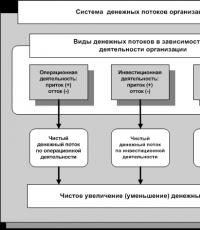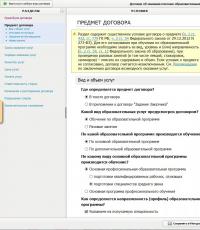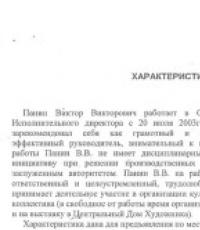Inspection for work with personnel. I'm from the personnel inspection. How did your future career develop?
- Alexander Borisovich, tell us a little about your childhood.
I was born in the Soviet Union, on the shores of the Black Sea. As a child I wanted to be a sailor. Father served in border units Navy. I loved wearing his peacoat. When the time came to enter the naval school, I had to decide on a specialty. I remember how my uncle tried to persuade me to go study to become a cook: “This is the second captain on the ship!” We were taught to cook, as they say, in full, and this experience has helped me out more than once in my life.
-Did you serve in the navy?
No, that's it life stage I became acquainted with the Ministry of Internal Affairs. I served in internal troops. We, recruits, were taken somewhere on the other side of the world - to Kemerovo. There I saw a lot of snow for the first time.
- You, of course, served in the kitchen?
No, in a completely different specialty. When we were still in “quarantine” after arriving, I, while in uniform in the kitchen, saw how a soldier, and for me then an old-timer, was struggling with cutting pork. I then told him that I would use a knife to remove all the flesh from the back whole. The bones will be separate, the meat will be separate. He said it was impossible, but agreed to bet two pieces of butter. When I fulfilled my promise, I looked back and saw that everyone who was in the kitchen had gathered around me and looked as if I was David Copperfield. They began to woo me to the kitchen, but I categorically refused.
Even as a child, I really liked the film “The Cabin Boy from the Schooner Columbus,” about scouts. There was a hero who masterfully transmitted messages through Morse code. I was impressed for life. And in the army I took advantage of the opportunity to choose a military specialty. During his studies he was trained to be a radiotelegraph operator.
- Do you still remember Morse code?
Certainly. They taught well, thoroughly. There, in the army, I had to ski for the first time. It was hard: my legs spread apart, the machine gun hits my sheepskin coat, my pouch dangles, my belt gets twisted. I remember this episode. On the second kilometer I felt a little more confident and decided to slide into the ravine the way professional skiers do on TV. Right at the saddle he fell, somersaulted and ended up on his side. I decided to get up, leaning on a stick. As a result, the hand, along with the stick, sank into the snow up to the shoulder. Later I learned that those bushes that stuck out of the snow nearby were not even bushes at all, but the tops of trees that were almost completely covered with snow.
Did you happen to do police work in the internal troops or did you serve as a radiotelegraph operator in a unit?
I also had a chance to run after a crook. There I received my first badge “For Distinction in Service” of the Internal Troops of the Ministry of Internal Affairs of the USSR.
At the end of the “imprisonment” I became a 1st class radiotelegraph operator, which was already quite serious. The extra pay was good for this.
- What happened after the military service? Where did the radio operator, cook Polyutkin, decide to find a job?
At the time of my demobilization, my former colleague had already been working in the police in Moscow for a year. This was the 1st departmental police regiment. This is where I came in 1982. He ended up in the 4th division, commanded by a front-line soldier, Colonel Pugachev.
- Was it difficult to get used to the new place?
The break between military and police service was about a month. I didn’t have time to get out of the habit of discipline and uniforms. I seriously had to master the weapon - the PM, instead of the army Kalashnikov.
- What did your unit do?
Protection of important facilities throughout the capital. I worked in the TASS Photo Chronicle building. There I met big amount interesting people. Let's say that today, probably, few people know Musa Ilyan - this is a photographer who worked with Brezhnev. I remember how the first beauty contest was held there, organized by Moskovsky Komsomolets. Over time, I learned to take photographs myself. Then he used this skill in his work at the administrative site, compiled photo tables from crime scenes, and took photographs on business trips in the North Caucasus. I still film today, being the head of the district personnel inspection during field trips to incidents.
- Did you want to change your profession?
No. But I realized that I needed to move on and entered the police secondary school. The focus of teaching was on law enforcement practice, and not general issues theories. The class was filled with police officers with direct work experience, not yesterday's schoolchildren. I was most interested in operational-search activities, but it turned out that after graduating from the MSSM I came to the district police department to work as a district police officer.
- What, in your opinion, most distinguishes the Soviet police from the modern police?
In general, the operational situation was calmer. This affected the work of law enforcement officers. Nowadays a policeman with a machine gun is the norm, but back then this was not the case at all. Most of all, the difference was noticeable in the active life position of police officers and citizens. The police went to work and home in uniform. As a result, a number of offenses and crimes were suppressed during off-duty hours. This also happened in my practice. On weekends, we, departmental security officers, often went to territorial units, where we helped our colleagues in preventing burglaries. There were operational regiments of the PG, which acted as a universal reserve and provided support if necessary.
Here, for example, is such a case. As a local police officer, I was walking through my territory and noticed noise in the garages near house 21 on Marshal Zakharov Street. There was a massive fight, about 15 people took part in it. I had my service pistol with me, but it would have been stupid to use it in such conditions. I called the duty officer on the radio and within a minute 5 police cars came to my aid!
- Tell us about your work at the administrative site.
There were 30,000 people living in the service area of our stronghold. The territory was vast: from railway(Moskvorechye platform) to house 80 on Kashirskoye Shosse and the intersection between Shipilovsky Proezd and Shipilovskaya Street. A residential area, part of Tsaritsynsky Park, a giant cucumber collective farm, garages, etc. At first, this territory was served by 3 people, and then, when I became the senior district police officer, 7 district police officers worked at the strong point.
My teacher was a wonderful, experienced district police major, Viktor Nikitin. He worked in investigations for a long time and was very scrupulous and meticulous. Viktor Borisovich most of all focused my attention on high-quality and daily work in the residential sector. He advised me, for example, to show up at my station even before the morning divorce at the department, put a book with detention in my folder, and then, on the way to the stronghold, go to a couple of apartments and get to know the residents.
Over time, I got as many as 15 assistants - freelance police officers. A deputy chief of service lived on the territory of our stronghold, and he once told me that he saw a detachment of my freelancers marching in formation and was even a little scared. These were very militant and energetic guys with an active lifestyle. Imagine: people without a uniform, without weapons, with only one ID in their pocket, and they detained swindlers, robbers, and drug dealers. Some of them later got jobs in the internal affairs bodies. I can say that in the hard times of the 90s they provided me with invaluable help.
Yes, the Orekhovo district in the 90s was well known as the birthplace of the Orekhovskaya criminal group and its famous leader Sylvester.
I worked at the site from 1989 to 1996 inclusive. After the collapse of the Soviet Union, which my colleagues and I experienced very hard, devastation set in, but I believe we did everything possible to protect the peace and safety of citizens.
Sylvester was our support. They fought against racketeering. I remember there was a case when I had to play the role of the director of a store to which the “brothers” came. They detained guys who had knives and gas pistols, and worked closely with the criminal investigation department and other services.
Our work is like a collective game; it is important to act harmoniously as a team. No crime is solved individually. Services should not compete with each other for numbers and indicators, but work together for results.
- How did your future career develop?
I decided to go to work at the passport office and wrote a report to the chief, police colonel Vasily Ageechev. He was a wise leader, he had the Higher Party School behind him, and at that time it was aerobatics. He made a counter proposal - to take the position of deputy for work with personnel at the Biryulyovo Zapadnoe police station. I agreed, although for me, an ordinary senior district police officer, this was an unexpected offer; I was worried whether I could take on such a huge responsibility. I began to learn the basics of this serious and, as it turned out, necessary profession. I did not inherit the best inheritance from my predecessor. My experience in police work helped, I understood what officers could and could not do.
Police officers and doctors tend to have a certain dulling of the sensation of other people's pain, partly this is natural, but it must remain, no matter what. I tried to encourage my staff to empathize with the people they were called upon to help.
Together with the Soviet Union, the party system of educational work collapsed. How did you get out of this situation, what did you rely on?
In 1996, Directive No. 1 and Order No. 426 of the Ministry of Internal Affairs were issued. Chiefs of all levels were oriented to always tell the truth and independently identify and punish violators of discipline. They received thanks and bonuses for their principled work with subordinates. And before this, it worked out like this: the commander identifies the violator and then himself receives a penalty for it. The system itself began to get rid of drunkards and rowdies. Once there was such a case. I fired an employee for drinking and met him about ten years later. He told me thank you. The dismissal was such a strong shock for this man that he still does not drink.
Yes, some ideals were gone at that time, while others had not yet appeared. However, service in the police required specific adherence to official discipline and the rule of law, and called for serving people, regardless of political and economic systems.
You worked as deputy head of personnel affairs in the district department from 1997 to 1999, what happened next?
Then I went to work at the Department of Educational Work of the Moscow City Internal Affairs Directorate. The 2nd “inspection” department, in which I worked for 5 years, was the founder of the modern personnel inspection. We went to district departments without warning, carried out checks there, came under the guise of applicants, and gave various introductions. The results of our visits were placed on the table of the head of the headquarters. Most of all, the fight was waged against drunkenness in the units and concealment of materials from records.
Then I returned to the Biryulyovo Zapadnoe police station to my previous position as deputy chief for personnel relations. He paid special attention to the “Combat Leaflet”, wrote it himself, laid it out, printed it, and hung it on the wall. I remember how one veteran came to the department with his grandson to show him an article about himself.
In 2007, I received an offer to head the Inspectorate for Personnel of the Internal Affairs Directorate in the Southern Administrative District.
- How is the work of the Personnel Inspectorate currently handling complaints against police officers?
I can say that today a coherent system of reception, registration, accounting, consideration, permission, reporting and analysis has been created. We receive 2-2.5 thousand messages via “02”.
- Does information from helplines also come to you?
Yes, and information from the management website. The helpline most often works when placed on traffic police vehicles. People call and complain, we check these messages and keep records. By the way, we were probably the first to have an electronic file cabinet - this is an excellent help in the work of analyzing violations of discipline.
- Who do people complain about most often?
For traffic police officers, of course. They are always in sight, working with people on the street. But not all complaints are justified; complaints often come from those who thereby want to take revenge on the police for drawing up a report.
- How do you interact with the district OSB?
I can say that in our, probably the only district administration, interaction is structured in the same way as in the best Soviet years between district police officers and operatives in pursuit of a common result. In our case, this result is order and legality in the internal affairs bodies. Our work is not aimed at “fighting” personnel. We speak out in defense of our employees if it turns out that the police acted lawfully and reasonably.
Sergey LYUTYKH, photo by N. MALTSEVA
Analyst/document specialistDirect employer "" is looking for an employee for vacant place in your organization for a position " Analyst/document specialist". Mandatory requirement of the employer for the work experience of the desired employee: not required. Type of employment for the vacant job " Analyst/document specialist"in a company (firm, organization, individual entrepreneur)" State bldg. Inspectorate for Personnel of the Internal Affairs Directorate for the Eastern Administrative District of the Main Directorate of the Ministry of Internal Affairs" : Full time, full time. Vacancy No. 5454528 for the position " Analyst/document specialist" refers to the industry of activity "Civil service, non-profit organizations" → "Archivist" . Vacancy No. 5454528 for the position " Analyst/document specialist"added to the database of the website about work and employment Electronic Employment Service in Wednesday, July 3, 2019 and after publication by the moderator of the web portal for job seekers, it is available for viewing by all registered unemployed. Date of update of the vacancy profile No. 5454528 for the position " Analyst/document specialist"on the website of the Electronic Employment Service: Monday, July 8, 2019. Company (organization, firm, individual entrepreneur) " State bldg. Inspectorate for Personnel of the Internal Affairs Directorate for the Eastern Administrative District of the Main Directorate of the Ministry of Internal Affairs"job offered in the city Moscow. Employer of the company (firm, organization) "State Corp. Inspectorate for Personnel of the Internal Affairs Directorate for the Eastern Administrative District of the Main Directorate of the Ministry of Internal Affairs" can offer approximately the following salary: from 22,000 to 22,000 rub. in your arms in a vacant position "Analyst/document specialist". Duties of an employee in a vacant position "Analyst/document specialist" includes the following:
To obtain a contact telephone number (or other contact information) to contact the employer " State bldg. Inspectorate for Personnel of the Internal Affairs Directorate for the Eastern Administrative District of the Main Directorate of the Ministry of Internal Affairs"from city (region) Moscow, You first need to send a letter from our Electronic Employment Service with a file of your resume attached to it, or indicate in the text of the message to the employer a link to your resume on another site for job seekers. Employer " State bldg. Inspectorate for Personnel of the Internal Affairs Directorate for the Eastern Administrative District of the Main Directorate of the Ministry of Internal Affairs" will review your resume and provide your contact information (phone number, e-mail, fax, Skype, ICQ), where you can contact him about an interview to take a vacant job " Analyst/document specialist". |
 pay attention to website Electronic Employment Center .
pay attention to website Electronic Employment Center .
Go to the page " Find a job by vacancies in the Employment Center
Submit your resume to the Employment Center
 Go to Electronic Labor Exchange website with an up-to-date database of job offers in the form of vacancies.
Go to Electronic Labor Exchange website with an up-to-date database of job offers in the form of vacancies.
Go to the page " Find a job based on vacancies on the Labor Exchange
" and look for the latest vacancies or go to the page " Post your resume on the Labor Exchange
", add your resume and after its publication you will start receiving fresh vacancies with job offers.
 Visit the Job Aggregator from employers in Russia and the CIS with an up-to-date database of job offers in the form of job advertisements.
Visit the Job Aggregator from employers in Russia and the CIS with an up-to-date database of job offers in the form of job advertisements.
On the portal RABOTKA.com.ru a convenient job search in the city of Moscow using a complete database of fresh vacancies of the Employment Service of the City of Moscow
.
All vacancies from the Employment Service portal
You can conveniently browse the job offer aggregator website RABOTKA .com.ru in the form of a list or search for vacancies taking into account your city of residence and the desired position.
The exact address: 15th Parkovaya St., 37/61, Moscow, Moscow region, Russia, 105484
Telephone: +7 495 468-54-34 Location on the map Inspectorate for Personnel of the Internal Affairs Directorate for the Eastern Administrative District of the Main Directorate of the Ministry of Internal Affairs of Russia for MoscowReviews
How do you like the Inspectorate for Personnel of the Internal Affairs Directorate for the Eastern Administrative District of the Main Directorate of the Ministry of Internal Affairs of Russia for Moscow? Would you like to add a review about this organization? If you have something to say, do not hesitate, we will be very grateful for your opinion.
No one has left a review for this organization yet!
Police in East Izmailovo
Reviews
Surprise
★
★
★
★
★
- number of points: 5 out of 5
Gennady wrote: yesterday at 15:19
I was in Astrakhan on business. I didn’t choose the hotel, the reservation and payment were made by the host.
The hotel is conveniently located, comfortable, the room is spacious, everything you need is there. The staff is almost invisible, but they cleaned regularly.
I can confidently recommend it.
Treatment and diagnostic center Factory of Smiles
★
★
★
★
★
- number of points: 5 out of 5
Demidova Yulia wrote yesterday 23:32
My mother turned to a gynecologist for help with the onset of menopause, as her hormonal levels began to suffer greatly and my mother often experienced unpleasant sensations in her body. At the clinic, we were advised by doctor Mikhailova Y.R., who prescribed my mother hormonal therapy, thanks to which her physical and psychological condition began to improve. Thank you very much for the qualified assistance provided.
Implosion
★
★
★
★
★
- number of points: 5 out of 5
Marina wrote yesterday 17:17
Why can’t you make a return at this pharmacy if the package is unopened and you have a saved receipt?? I bought diapers for a bedridden patient. The pharmacist sold the package, asking for hip measurements. When I brought it home, I didn’t have time to unpack it, and on the packaging the size indicators are determined by waist size and not hip size. How so? The medical pharmacist does not know where the waist and hips are, thereby confusing the buyer in choosing the right package! I left the sick person and ran back to this pharmacy in the hope of getting a refund for an incorrectly sold product, to which the pharmacist replied that there might be a big belly at the waist and they are not supposed to make a return! How so?!





